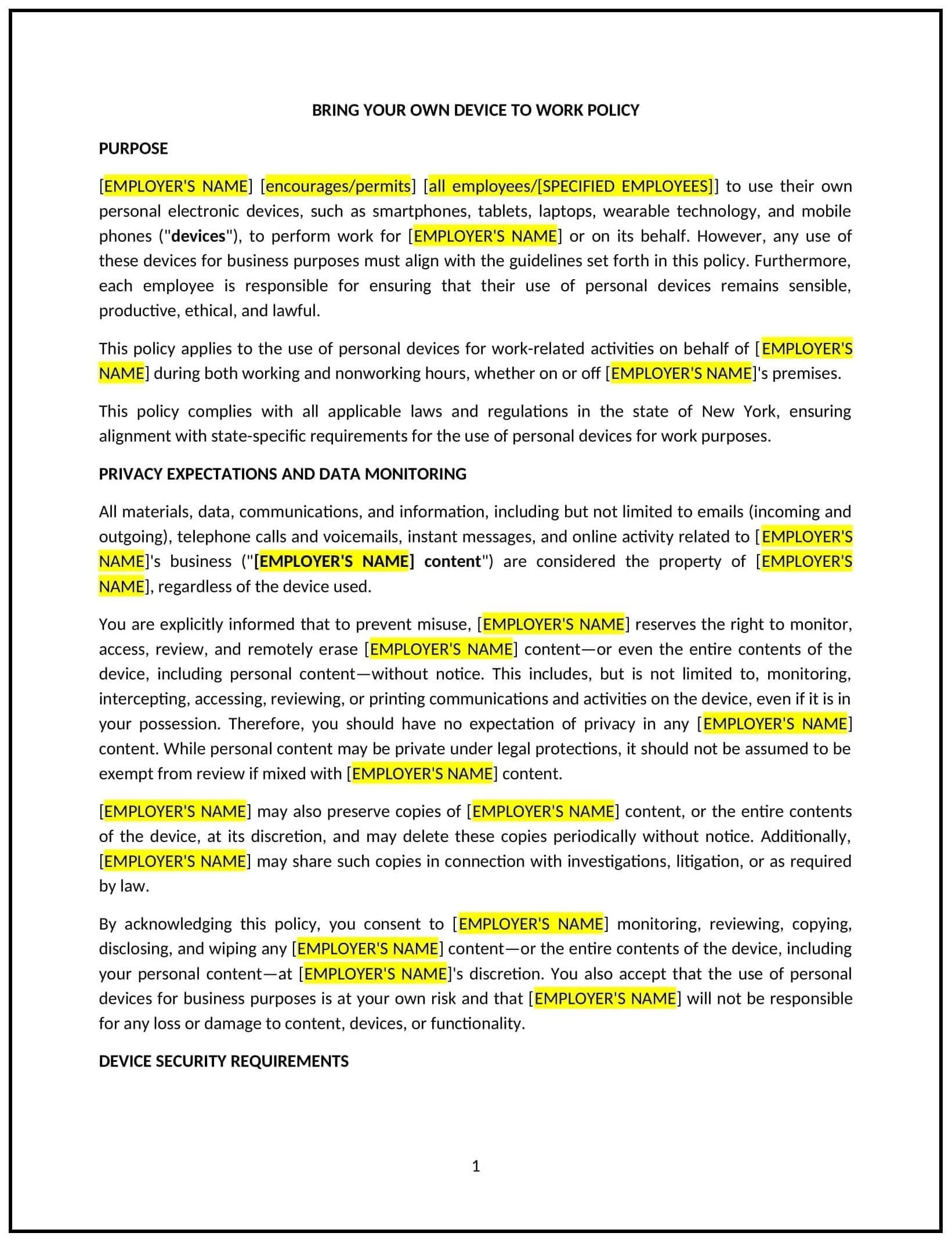Bring your own device to work policy (New York): Free template
Got contracts to review? While you're here for policies, let Cobrief make contract review effortless—start your free review now.

Customize this template for free
Bring your own device to work policy (New York)
A Bring Your Own Device (BYOD) policy helps New York businesses establish guidelines for employees who use their personal devices, such as smartphones, laptops, or tablets, for work purposes. This policy outlines the responsibilities of both the business and the employees in relation to the use of personal devices, ensuring that the business maintains security, compliance, and productivity while respecting employees' privacy. The policy also specifies the acceptable use of personal devices for work and the steps businesses must take to protect sensitive data.
By implementing this policy, businesses can promote efficiency, reduce hardware costs, and support employee preferences for using familiar technology, all while safeguarding business data and maintaining compliance with relevant laws.
How to use this Bring Your Own Device (BYOD) policy (New York)
- Define acceptable use: Clearly outline what is considered appropriate use of personal devices for work. Specify which applications, platforms, and activities are allowed, as well as any restrictions on the type of work that can be done on personal devices.
- Establish security measures: Set clear guidelines for securing personal devices used for work, including requiring strong passwords, encryption, and remote wiping capabilities in case of theft or loss. The policy should also cover the installation of antivirus software and security updates.
- Address data privacy and confidentiality: Specify how sensitive data will be handled on personal devices, ensuring that employees understand their obligations regarding privacy and confidentiality. This should include guidelines on preventing unauthorized access to business information.
- Provide support and troubleshooting: Outline the level of support that businesses will provide for personal devices used for work. Define which issues will be covered under company support services and which will remain the responsibility of the employee.
- Outline employee responsibilities: Define employees’ responsibilities when using their devices for work, including maintaining security, reporting lost or stolen devices, and ensuring that company data is not compromised.
- Ensure compliance with legal requirements: Ensure that the BYOD policy complies with New York state laws and any applicable federal regulations related to data privacy, security, and employee rights. The policy should also outline the process for handling personal devices in the event of an employee’s departure from the company.
- Reimbursements and expenses: Specify any reimbursements or financial support the business will provide for employees who use their personal devices for work, including any equipment or data charges that may arise.
Benefits of using this Bring Your Own Device (BYOD) policy (New York)
This policy offers several benefits for New York businesses:
- Increased flexibility and productivity: Employees can use their preferred devices, which can increase comfort, satisfaction, and productivity, as they are more familiar with their personal technology.
- Cost savings: The policy allows businesses to save on hardware costs since employees are using their personal devices for work, reducing the need for the company to purchase and maintain devices.
- Improved employee satisfaction: Providing employees with the option to use their own devices promotes trust and flexibility, which can enhance job satisfaction and retention rates.
- Enhanced security and data protection: The policy outlines security protocols for employees to follow, ensuring that sensitive business data is protected on personal devices. It also includes measures for remotely wiping data if a device is lost or stolen.
- Legal compliance: By ensuring that personal devices used for work comply with New York state laws and federal regulations on data protection and privacy, businesses reduce the risk of legal liabilities related to the misuse of personal devices.
Tips for using this Bring Your Own Device (BYOD) policy (New York)
- Communicate the policy clearly: Ensure that all employees understand the BYOD policy, including their responsibilities, the security measures in place, and the acceptable use guidelines. This can be done through onboarding, employee handbooks, and regular reminders.
- Monitor device security: Regularly assess the security of personal devices used for work to ensure compliance with the policy. This may include conducting security audits and requiring periodic updates to device settings, passwords, and software.
- Set boundaries on work-related tasks: Specify which tasks are acceptable to perform on personal devices and which should be reserved for company-issued equipment. This helps manage risk and ensures that employees are not overburdened with tasks on their personal devices.
- Provide clear guidance on data security: Educate employees on best practices for securing company data on their devices, including using strong passwords, enabling encryption, and setting up remote wipe features in case of device loss.
- Ensure support is available: Provide employees with clear instructions on how to get support for work-related issues on their personal devices, while ensuring that issues unrelated to work remain their responsibility.
- Review and update the policy regularly: Regularly review the BYOD policy to ensure it remains effective and compliant with New York state and federal laws. This includes updating the policy to address emerging risks or technology trends.